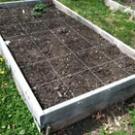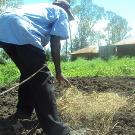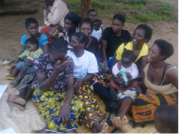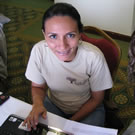Community Based Adaptation to Climate Change News
Climate Smart Agriculture | Grenada | Kenya | New Routledge CBA Field Guide | January Resources | Village Level Adaptation
Climate Smart Agriculture | Grenada | Kenya | New Routledge CBA Field Guide | January Resources | Village Level Adaptation
THIS MONTH’S NEWS
CLIMATE CHANGE FIELD PROJECTS.
| GRENADA | Climate Smart Agriculture Training Workshop: Dual Challenge—Drought and Flooding |
 |
Gillian Primus (Grenada), Hanna Bartel (Canada), and Meredith Waters (US) have been working for the past year on a project on the island of Grenada. The team developed a project to increase crop production with highly specific activities to target specific in-field challenges. Last month they led a CSA workshop.
“The workshop introduced six different types of agricultural techniques that would be useful for the community, based on our research of results in similar contexts. As such, the materials we have gathered so far should be enough for this introductory workshop, and we are relying on the extension agent to know all the details! We have developed a lesson plan to guide the workshop.” See workshop activities and photos.
|
| KENYA | Climate Smart Agriculture Practices for Extreme Weather Events and Changing Seasons |
 |
Joyce Onyango (Kenya), Aramide Adebola (Nigeria), and Natalie Macawaris (Philippines) have been working for the past year on a project in Kenya. Recently they conducted a participatory vulnerability and capacity assessment with the community. Extreme weather events began 30 years ago in 1980 with a major drought. The team developed a project to increase crop production, and then identified activities to target specific agricultural challenges. They held an agricultural workshop on these activities: • Making compost for increased soil organic matter • Planting of Napier grass for conserving topsoil and water in farm fields • Seed bed establishment • Mulching for retaining soil moisture |
| JANUARY FIELD GUIDE |
Community Based Disaster Risk Reduction |
 |
It is estimated that over 70% of all disasters are now related to extreme weather events. Developing a DRR plan can include all the activities in the field guide—and a method for maintaining them in perpetuity. This will involve a plan for consciousness-raising among community members about DRR challenges, connecting with an early warning system, organizing teams and training them in evacuation and search and rescue, and prioritizing mitigation strategies. Frequently community members don’t have a clear picture of how and why disasters happen. They also may not know how to react when a disaster is building. Workshops and simple posters need to be developed to help them understand these concepts and to learn that there are things that they can do to reduce the risk caused by disasters, and to mitigate the severity of the disasters. Download the field guide.
|
| BOOK LAUNCH | Routledge/Earthscan Release ‘A Field Guide To Community Based Adaptation’ |
 |
‘Tim Magee, and his colleagues at CSDi, are to be commended for producing a book which should change the way development is practiced, and so directly contribute to the improvement of millions of lives around the world.’ – Howard White, Executive Director, 3ie, USA
‘A fascinating and informative guide to a subject of growing international importance. Tim Magee skillfully explains ways to combine external expertise and local perspectives on adaptation to climate change. This useful book should be read by development practitioners as well as students of climate change policy and international development.’ – Tim Forsyth, London School of Economics and Political Science, UK
‘This is a most-awaited book for development practitioners who are increasingly confronted with the challenge of addressing climate risks in designing and implementing programmes and projects. This book will help them to do just that in a way that places the interest of communities at the heart of the process.’ – Kareff Rafisura, Climate Risk Management Practitioner, Ghana
|
‘This book provides an insightful and comprehensive field guide to community-based adaptation. Magee brings together an impressive range of tools, resources and case examples in a clear and systematic step-by-step guide, while ensuring that the concerns of local people are kept at the centre of the analysis. This book is a timely and welcome addition to the literature, and will be useful to experienced practitioners as well as newcomers to CBA.’ Lars Otto Naess, Climate Change Team, Institute of Development Studies, UK
| PROJECT RESOURCE |
Best of January Project Resources for Community Based DRR |
 |
1. Community Based Disaster Risk Reduction – Good Practice. Mercy Corps Nepal. This handbook looks at 10 easy for communities to understand DRR field practices such as early warning systems, and evacuation and search and rescue teams. 2. Flash Flood Risk Management. A Training of Trainers Manual. Very well developed professional manual. Shresth, A. B., Chapagain, P. S., Thapa, R. International Center for Integrated Mountain Development. 2011 |
| Winter Quarter | Are you interested in: |
 |
Would you like to learn how to develop Community Based Adaptation Projects?
What’s happening in the region where you live?
Please write us with your stories, thoughts and comments through Online.Learning@csd-i.org
Please write us with your stories, thoughts and comments through Online.Learning@csd-i.org
I look forward to hearing from you.
Sincerely,
Tim Magee, Executive Director
Would you like to subscribe to this newsletter?
The Center for Sustainable Development specializes in providing sound, evidence-based information, tools and training for humanitarian development professionals worldwide. CSDi is a 501(c)(3) nonprofit organization.
One comment